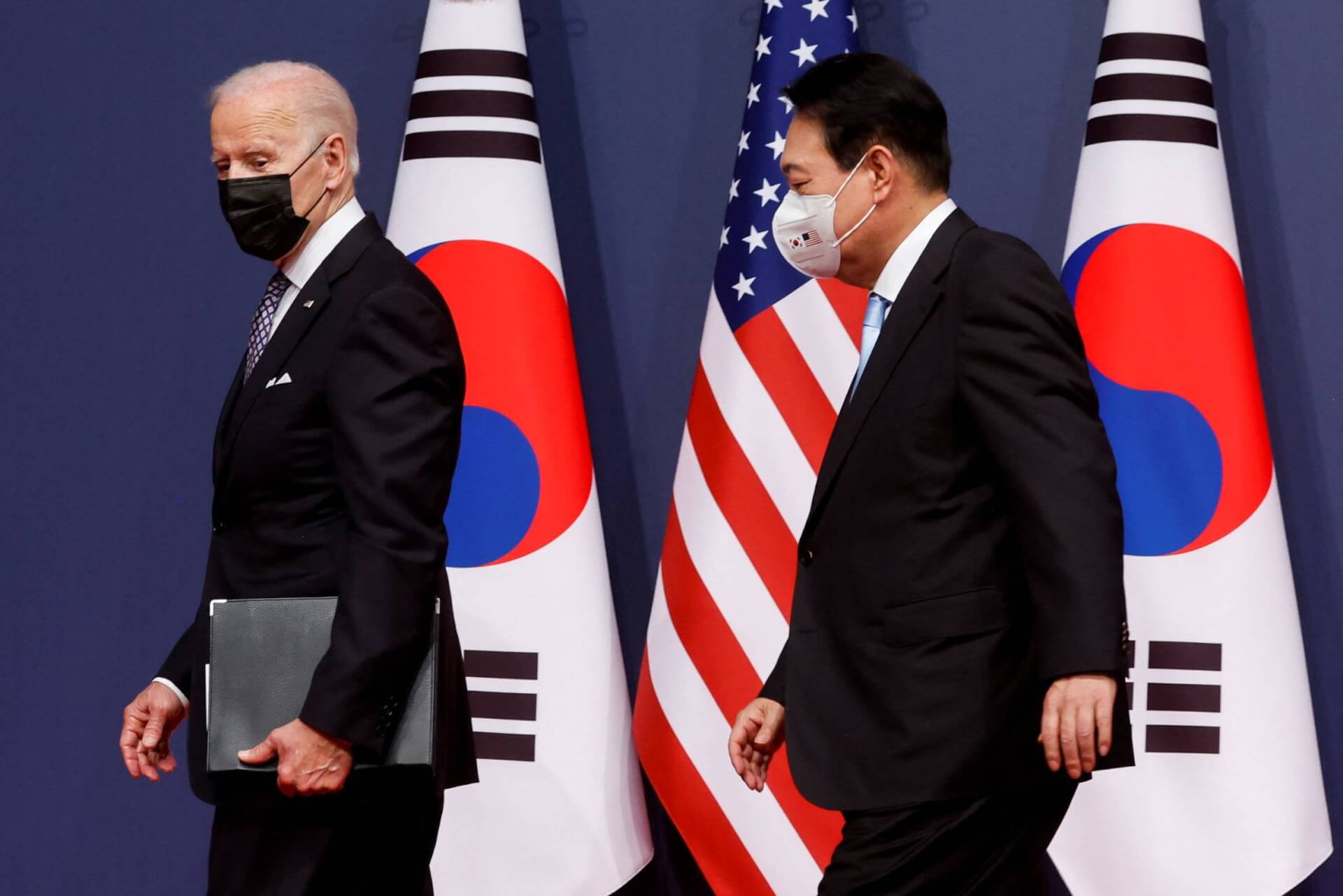During his meeting with United States (US) President Joe Biden in Seoul on Saturday, South Korean President Yoon Suk-Yeol agreed to “strengthen deterrence” and upgrade their strategic partnership and mutual defence treaty in order to jointly “address the security threat posed” by North Korea.
In their joint statement, the US affirmed its “extended deterrence commitment” to Seoul “using the full range of US defence capabilities, including nuclear, conventional, and missile defense capabilities.” “Considering the evolving threat posed” by North Korea, the statement further added that both leaders agreed “to initiate discussions to expand the scope and scale of combined military exercises and training on and around the Korean Peninsula.”
The US also reaffirmed its commitment to deploy its strategic military assets “in a timely and coordinated manner as necessary, as well as to enhance such measures and identify new or additional steps to reinforce deterrence in the face of” North Korea’s “destabilising activities.” Washington and Seoul “will significantly expand cooperation to confront a range of cyber threats” from Pyongyang, “including but not limited to, state-sponsored cyber-attacks,” the statement said.
Biden and Yoon underscored that North Korea’s nuclear programme poses a “grave threat to peace and security” across the world. To this end, their joint statement stressed on their demand for the “complete denuclearisation” of the Korean Peninsula and condemned North Korea’s recent “escalatory” ballistic missile tests. They emphasised that the “path to dialogue remains open” and called on Pyongyang to “return to negotiations.” They also spoke of the importance of cooperation with Japan in confronting North Korea.
President Biden was welcomed by President Yoon Suk Yeol as he delivered remarks on the partnership between the U.S. and Republic of Korea – among each other’s largest trading and investment partners. pic.twitter.com/vIQJ3h5bXv
— The White House (@WhiteHouse) May 20, 2022
Over the past year, North Korea has conducted 17 weapons tests, including the Hwasong-17 supersonic missile earlier this year. It is not clear if the latest test was a nuclear-armed weapon. Despite the strict lockdown measures put in place recently, Supreme Leader Kim Jong Un has asked officials to move ahead with “scheduled constructions, agricultural development, and other state projects,” whilst strengthening the country’s defence apparatus, possibly hinting at continued weapons testing and nuclear programme.
In this regard, Yoon said during the joint press conference with Biden that “sustainable peace on the Korean Peninsula is underpinned by a principled and consistent policy towards North Korea.” “In lockstep coordination with the Biden administration, I commit to resolutely safeguard peace on the Korean Peninsula and encourage North Korea to come forward for dialogue and engage in practical cooperation. I will exert diplomatic endeavors to that end,” Yoon said.
The joint statement added that both leaders condemn North Korea
Happening Now: President Biden and President Yoon Suk Yeol of the Republic of Korea deliver remarks. https://t.co/QwMdIQNbWK
— The White House (@WhiteHouse) May 20, 2022
Moreover, both sides also “shared concerns about the rapid spread of COVID-19” within the rouge state and “expressed support for working with the international community to provide assistance.” Only last week, Pyongyang reported that the secretive regime’s COVID-19 caseload neared almost two million amid a “severe” national emergency and nationwide lockdown.
“Currently, North Korea is struggling with a COVID-19 crisis. Putting aside political and military considerations, I am more than willing to provide assistance from humanitarian and human rights perspectives. I call on North Korea to respond to this proposal positively and begin taking practical steps towards denuclearization,” Yoon said.
North Koreans are facing a uniquely acute catastrophe right now.
— Human Rights Watch (@hrw) May 19, 2022
US President Joe Biden and newly elected South Korean President Yoon Suk Yeol should pledge to include human rights benchmarks in future negotiations with North Korea.https://t.co/LJjfpuZ6OB pic.twitter.com/XRsYFW2nmC
Seoul also joined Washington in condemning Russia’s war in Ukraine. A readout released by the White House on Saturday said that the two leaders had “reaffirmed their commitment” to strengthen their bilateral alliance “and to broaden its focus beyond the Korean Peninsula to take on global challenges, including threats to the rules-based international order, such as Russia’s invasion of Ukraine.”
They also spoke of the need to use the “volatility” in the energy market caused by the Russia-Ukraine war as an opportunity to diversify the energy supply chain to include more clean energy technology.
In addition, Yoon and Biden also committed to “increasing cooperation” in a range of “priority issues” such as “critical technologies, economic and energy security, global health, and climate change.” They two discussed their “shared belief in constitutional democracy and the importance of respecting individual rights as well as strengthening the regional security environment.”
Biden didn’t go to the DMZ but stood in front of a large map of it. He and Korea’s new president, Yoon Suk Yeol, stopped by the combat operations floor at the Air Operations Center at Osan Air Base to greet military members and send a signal of joint power to adversaries. pic.twitter.com/Klu7WxFpUO
— Jennifer Jacobs (@JenniferJJacobs) May 22, 2022
“Our two nations are working together to take on both the opportunities and the challenges of the moment: continuing to fight COVID-19, securing the supply chains, tackling the climate crisis, deepening our security cooperation to meet regional challenges, and writing the rules of the road to ensure the Indo-Pacific is a free and open area,” Biden said during their meeting.
Both leaders also visited the Air Operations Center’s Combat Operations Floor on Osan Air Base on Sunday, where more than 250 American troops are stationed. Yoon extended his “deepest respect” and “gratitude” to the American troops for their “service protecting world peace and freedom.”

